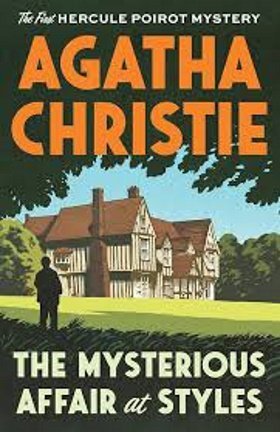Mary Cavendish was standing where the staircase branched, staring down into the hall in the direction in which he had disappeared.
“What has happened to your extraordinary little friend, Mr. Hastings? He has just rushed past me like a mad bull.”
“He’s rather upset about something,” I remarked feebly. I really did not know how much Poirot would wish me to disclose. As I saw a faint smile gather on Mrs. Cavendish’s expressive mouth, I endeavoured to try and turn the conversation by saying: “They haven’t met yet, have they?”
“Who?”
“Mr. Inglethorp and Miss Howard.”
She looked at me in rather a disconcerting manner.
“Do you think it would be such a disaster if they did meet?”
“Well, don’t you?” I said, rather taken aback.
“No.” She was smiling in her quiet way. “I should like to see a good flare up. It would clear the air. At present we are all thinking so much, and saying so little.”
“John doesn’t think so,” I remarked. “He’s anxious to keep them apart.”
“Oh, John!”
Something in her tone fired me, and I blurted out:
“Old John’s an awfully good sort.”
She studied me curiously for a minute or two, and then said, to my great surprise:
“You are loyal to your friend. I like you for that.”
“Aren’t you my friend too?”
“I am a very bad friend.”
“Why do you say that?”
“Because it is true. I am charming to my friends one day, and forget all about them the next.”
I don’t know what impelled me, but I was nettled, and I said foolishly and not in the best of taste:
“Yet you seem to be invariably charming to Dr. Bauerstein!”
Instantly I regretted my words. Her face stiffened. I had the impression of a steel curtain coming down and blotting out the real woman. Without a word, she turned and went swiftly up the stairs, whilst I stood like an idiot gaping after her.
I was recalled to other matters by a frightful row going on below. I could hear Poirot shouting and expounding. I was vexed to think that my diplomacy had been in vain. The little man appeared to be taking the whole house into his confidence, a proceeding of which I, for one, doubted the wisdom. Once again I could not help regretting that my friend was so prone to lose his head in moments of excitement. I stepped briskly down the stairs. The sight of me calmed Poirot almost immediately. I drew him aside.
“My dear fellow,” I said, “is this wise? Surely you don’t want the whole house to know of this occurrence? You are actually playing into the criminal’s hands.”
“You think so, Hastings?”
“I am sure of it.”
“Well, well, my friend, I will be guided by you.”
“Good. Although, unfortunately, it is a little too late now.”
“Sure.”
He looked so crestfallen and abashed that I felt quite sorry, though I still thought my rebuke a just and wise one.
“Well,” he said at last, “let us go, mon ami.”
“You have finished here?”
“For the moment, yes. You will walk back with me to the village?”
“Willingly.”
He picked up his little suit-case, and we went out through the open window in the drawing-room. Cynthia Murdoch was just coming in, and Poirot stood aside to let her pass.
“Excuse me, mademoiselle, one minute.”
“Yes?” she turned inquiringly.
“Did you ever make up Mrs. Inglethorp’s medicines?”
A slight flush rose in her face, as she answered rather constrainedly:
“No.”

























